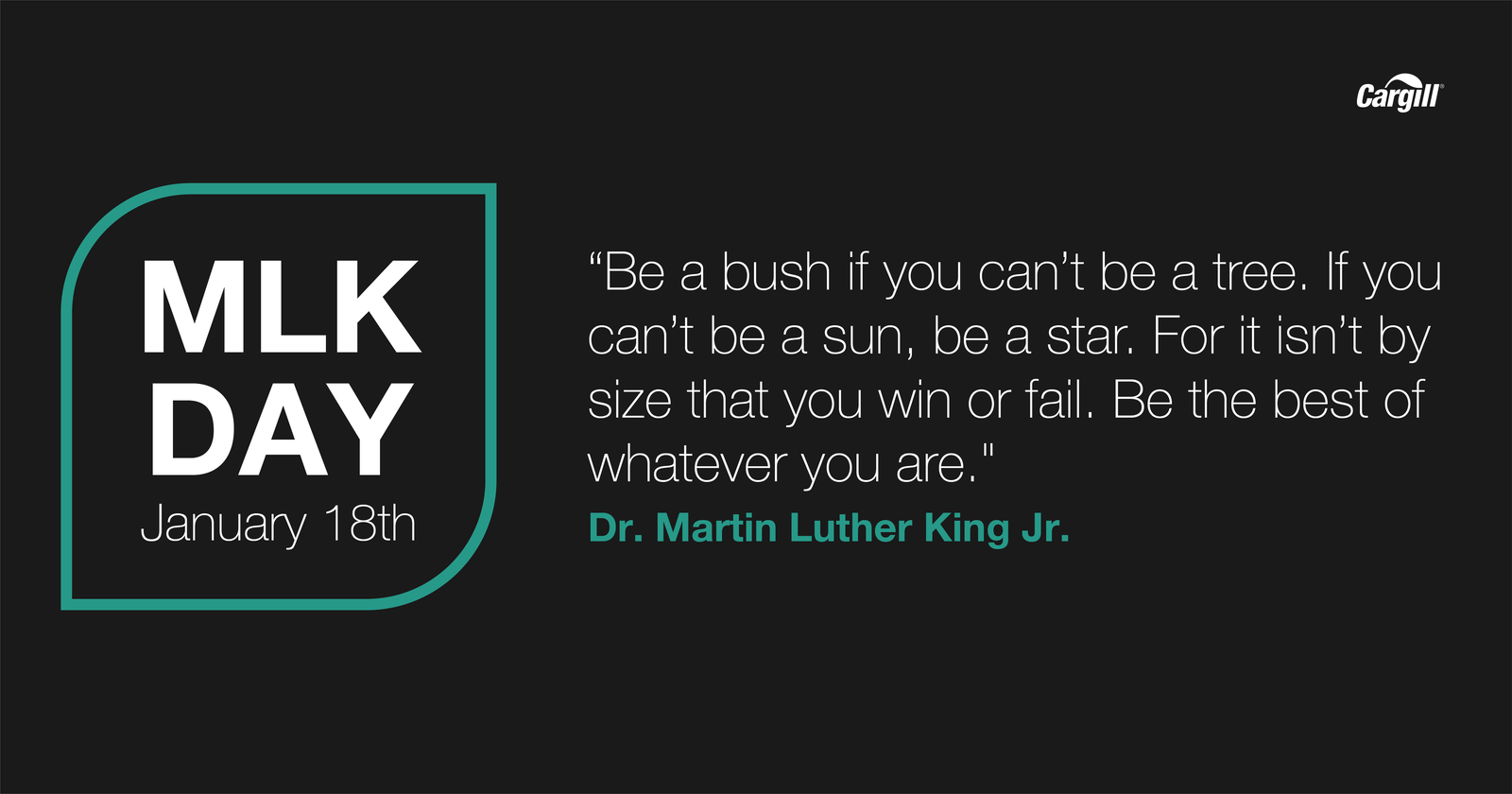On Martin Luther King Jr. Day, we reflect on the fierce urgency of now
Read Time: 4 minutes
January 18, 2021
On August 28, 1963, hundreds of thousands of people marched on Washington D. C. to defy the status quo and advocate for the civil and economic rights of Black Americans. Gathered on the grounds that stretch in front of the Lincoln Memorial, they listened to a Black man speak of the promise of democracy, and the need to fulfill that promise for people of color once and for all.
“We’ve come to this hallowed spot,” he said, “to remind America of the fierce urgency of now.”
Today, we honor that man. On Martin Luther King Jr. Day — a U. S. federal holiday that, starting this year, Cargill will observe in its annual U. S. holiday schedule — we choose to reflect on the teachings of Dr. King, which still echo nearly 60 years after the March on Washington.
Dr. King is widely recognized as one of the most influential and important historical figures in American history. As Dave MacLennan, Cargill CEO, puts it, “The U. S. is lucky to have had him as a leader to shape our history and society; his wisdom and words were never more true than they are today.”
People outside the United States, though, may not be as aware of MLK’s significance. For many, it may come as a surprise that a man who was murdered half a century ago so fiercely embodied the values Cargill employees, as one global team, aspire to every day: to put people first, to do the right thing and reach higher.
“Dr. King’s legacy lives on today in so many different and amazing ways, and I am proud that we now recognize a day at Cargill in his honor,” MacLennan added.
Indeed, MLK’s life and work deeply affects Cargill’s continuous efforts to build a more inclusive culture that strives for equity and empowers people of color in particular. From symbolic actions, like adopting Martin Luther King Jr. Day as a holiday, to more bolder steps forward, like the recent announcement to hire One million Black Americans during the next decade.

“Dr. King said there comes a time when we must take a position that is neither safe nor politic nor popular, but we must take it because our conscience tells us it’s the right thing to do,” said Myriam Beatove, Chief Human Resources Officer. “Our sense of urgency around diversity, equity and inclusion comes from that place of knowing it’s the right thing to do. It may not always be easy, but our conviction is strong.”
Almost 60 years after Dr. King delivered his iconic “I have a dream” speech, doing the right thing is still not easy. As Anna Richo, General Counsel, Chief Compliance Officer, Corporate Secretary and Cargill Ebony Council Executive Champion, puts it, Dr. King’s words are “a sharp reminder that our collective progress has not been enough: Anti-Black racism, racial discrimination and deep-seated divisions remain.”
The tragic killings of George Floyd, Breonna Taylor and countless other Black Americans are a grim reminder that Dr. King’s dream has not been fulfilled yet. Sonya Roberts, president of Cargill Salt, recently stood at the Minneapolis street corner where Floyd was killed and reflected on MLK’s words.
“I have chosen to follow Dr. King’s legacy. I am committed to be a creative force at work and in the community to make racial equity a reality,” she said.
That’s the message our leaders wish to ask of our Cargill colleagues around the world: to pause and reflect on Dr. King’s teachings, words and works; about the actions he took in life to advance civil rights through nonviolent resistance; about the violence that ended his life way too early; and about our collective responsibility to make the world better for us all, especially to those have been historically denied.
“Dr King once said: ‘Be a bush if you can’t be a tree. If you can’t be a sun, be a star. For it isn’t by size that you win or fail. Be the best of whatever you are,’” Natasha Swayzer Reedus, chair of the Cargill Ebony Council, said. “Dr. King’s legacy is a call to action for each of us. We have a responsibility to be changemakers and carry his legacy forward.”
Turn your thoughts into action
What can you do to maintain MLK’s legacy alive? Here are a few suggestions:
Learn more about his life: Whether you’ve studied him before or not, revisiting MLK’s life struggles and achievements can have a deep impact in our understanding of the historical and current struggles of Black Americans.
Reflect on what Dr. King’s legacy means to you: MLK helped change the world half a century ago. How can we embody his teachings? Try these resources.
- Virtual Event on Jan. 18 >> National Civil Rights Museum: King Day
- Virtual Events on Jan. 18, 19 & 21 >> Minnesota Historical Society: Black History, Black Voices
Then act on it. Dr. King taught us speaking out against racial injustice is not enough – we must do something to end it. What tangible action can you take today to advance racial equity in your communities?
Celebrate Black History Month. Cargill will highlight Black history, culture and achievements throughout February.
* Not all businesses and functions follow the same holiday schedule. In some locations, local customs may require the observance of one or more special holidays, and the local manager may add or substitute a special holiday.
